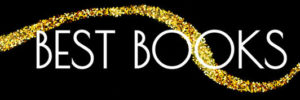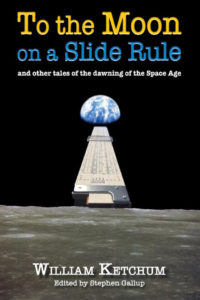Recommended Reading

As we approach the end of the year, various websites connected with reading begin showcasing the “best books of the year.” Some invite readers to vote on their faves in different categories.
The problem with those competitions is that many if not all of the people voting have read no more than one of the books. How can you honestly say Book X is better than Book Y if you’ve only read X? Or if you’ve arrived at the site because you’re on the author’s mailing list and are being lobbied for your vote?
I can’t participate in that. Despite having read and posted commentaries on 52 titles thus far in 2018, I know nothing about any of the ones getting this treatment.
But as I do every year, I can give honorable mention to my own faves, starting with this:
To the Moon on a Slide Rule and Other Tales of the Early Space Age, by William Ketchum
 William Ketchum is a rocket scientist who has been retired since the early 90s. During his career he was involved in developing the Atlas rocket, first conceived as a weapon for potential use against the Soviets and later repurposed for America’s first manned space launches. He talks briefly about some of the engineering challenges he dealt with, and includes short profiles of people he’s known (including Buzz Aldrin). He talks about growing up in California during WWII, about the effect of the war on his father, and how living in that environment led to his career choice. After retiring, he did a lot of traveling, e.g., to Pacific islands where his father had been stationed. He also delves into family history and describes the discovery of ancestors who fought on both sides of the Civil War. There’s a section of “weird” stuff he’s witnessed over the years, and miscellaneous speculations.
William Ketchum is a rocket scientist who has been retired since the early 90s. During his career he was involved in developing the Atlas rocket, first conceived as a weapon for potential use against the Soviets and later repurposed for America’s first manned space launches. He talks briefly about some of the engineering challenges he dealt with, and includes short profiles of people he’s known (including Buzz Aldrin). He talks about growing up in California during WWII, about the effect of the war on his father, and how living in that environment led to his career choice. After retiring, he did a lot of traveling, e.g., to Pacific islands where his father had been stationed. He also delves into family history and describes the discovery of ancestors who fought on both sides of the Civil War. There’s a section of “weird” stuff he’s witnessed over the years, and miscellaneous speculations.
The book is open to a criticism that it’s not focused on a single topic. On the other hand, it has something for everyone. There’s even a portion written as if for children, which might be the best of all.
In the interest of disclosure I must acknowledge having edited the manuscript. I worked with Bill Ketchum many years ago, developing proposals to the government for advanced space programs. His request for me to edit this collection of his writings came at a very good time. My son Joseph had just died and I hardly knew what to do with myself.
From time to time in recent years I’ve helped other friends with their manuscripts (two by Paul Clayton, for example, In the Shape of a Man and Van Ripplewink, and others not yet published). I enjoy that kind of work. In the new year I may alter my online presence and offer my talents as a book doctor. Thank you, Bill, for the nudge in that direction!
Here are just a few of the most outstanding books I enjoyed as a reader this year.
Best biography:
How Proust Can Change Your Life, by Alain de Botton
This author was a new discovery for me. Charmed by his unusual point of view and his well-crafted, melodious sentences, I’ve consumed four of his books over the last month or so. This one uses the record of Marcel Proust’s very uneventful life as the starting place for establishing several very practical rules on how to love life, how to take your time, how to suffer successfully, how to be a good friend, and so forth. Despite the focus on a little-read author from a century ago, it’s almost a how-to guide on living today.
Best short story collection
Flying Lessons and Other Stories, Ellen Oh, editor
Inevitably, in any collection of stories some will be better than others. However, there isn’t a stinker in this bunch. My favorite is the title story, “Flying Lessons,” by Soman Chainani, which is about a painfully shy boy taken on vacation by an unconventional grandmother and thrust into real life. But saying that takes nothing away from “Seventy-Six Dollars and Forty-Nine Cents,” by Kwame Alexander, a fetching tale about the fun a middle-school kid has with a newly acquired super-power (the ability to read minds), or from “The Difficult Path,” by Grace Lin, which is a more traditional tale about a Chinese girl sold into servitude (although its conclusion strays toward the realm of fantasy). And the rest are also close runners-up.
Best novels
Never Let Me Go, by Kazuo Ishiguro
I believe the real story here is about the acceptance of unexamined assumptions. The characters are so passive about what awaits them, and understanding of it is introduced, to them and to the reader, in such a gradual manner, that it produces only a vague discomfort. And yet it’s horrific. I believe their situation is meant to represent any condition into which we may be born that, if viewed objectively, would be cause for rebellion. As if rebellion would do any good. Different readers, with their own points of reference, seem to be reminded here of different injustices. In having a message that speaks personally to each of us, Never Let Me Go is like the best art.
The Industry of Souls, by Martin Booth
While visiting the Soviet Bloc to buy scrap iron, the main character, an Englishman, had been swept up in one of the purges by which Stalin populated the gulag with slave laborers. His grim experiences in a mine far below the earth’s surface are balanced by and interwoven with moments in a day many years later (his 80th birthday, in fact) when he’s enjoying his “daily neighbourhood perambulation” around the village where he’s made a new life for himself. There is wisdom here, and the essence of humanity.
The Labrador Pact, by Matt Haig
Matt Haig was another great discovery for me this year. As I did with de Botton, and also Ishiguro, I went on to read and admire several more of his titles. In this one, Prince is a fairly young labrador retriever with the responsibility of preserving unity in the Hunter family. It turns out labs are the only breed still serious about caring for their masters, who, being “only human,” would never manage on their own. The Hunter family has fault lines, and each of its members is being targeted by a bad outside influence. Prince is the only one who sees what’s happening, and the challenge is beyond his powers. I thought this sounded astonishingly close to my life story, which (in a far less poetic manner) I attempted to tell in my own book.
 Although having a disabled child meant total and absolute upheaval of life in our household, there are many variables. Another family’s experience is likely to be different.
Although having a disabled child meant total and absolute upheaval of life in our household, there are many variables. Another family’s experience is likely to be different.